Why should we repair stuff in our homes instead of buying new? Firstly, it’s a lot lighter on the wallet than buying a replacement. Secondly, you can tell everyone that comes round ‘I did it myself’ and they’ll be impressed by your efforts. And finally, it keeps items in use for as long as possible so new things don’t have to be made for no reason, conserving the planet’s scarce resources.
We’ve included five super simple hacks that anyone can do at home. There’s no need for expensive tools or complicated manuals with these cheap repairs – you’ve got this!
Remove rust with foil. Did you know all it takes is a balled-up bit of foil and you can get metal gleaming again? All you do is rub the ball of foil on the rusty part, and with a bit of elbow grease, it will remove the rust. This works inside on rusty sinks and hinges, and outside on bikes and garden furniture.
Remove stubborn mould from blinds. With the amount of rain we get in Greater Manchester, it’s pretty hard to avoid mould in your home. But a few black spots on your white roller blinds doesn’t mean you need to throw them away.
Fill the bath with cold water and bleach (bonus tip: bleach works better with cold water) and soak them for at least 1 hour. Rinse them off and hang to dry. This tip also works really well on plastic shower curtains.
Peel and stick wall and furniture covering. Got a scuffed side table or hate the colour of your kitchen cupboards? Peel and stick papers are a staple for renters who want to put their temporary mark on a property. These patterned sheets come in loads of colours and patterns and work like giant stickers to refresh your furniture; you can even get wallpaper versions.
Change colour with spray paint. Spray paint is amazing for changing up small items in your home like lamps, plant pots and picture frames. It’s super quick to apply and quick drying. Just be sure to do it outside and wear a mask to avoid breathing in the fumes and give the item a good dust before you start. Spray in thin coats to avoid blobs of paint.
Vacuum cleaner not working like it used to? Vacuums are expensive to replace – keep yours working well for as long as possible by showing it a little TLC. Properly cleaning the filter and the tubes can make a world of difference to how well it performs. If you’ve got a more serious fault, there are loads of local repair cafes and business who can help. Visit the Repair Directory to find your closest.
Need tools for a bigger project? Did you know the average drill is only used for 13 minutes in its lifetime! Don’t buy a drill to neglect it, use these hire schemes instead:
Hannah from Tread Softly transforms unwanted furniture into beautiful one of a kind pieces. Hannah shares her upcycling tips with us on how to get started.
As we are becoming increasingly aware of the need to reuse and recycle, there has been a surge of interest in upcycling furniture. I started my business Tread Softly out of a desire to challenge mass produced consumerism and a throwaway society and to highlight the benefits of upcycling old and unwanted items as well as reducing the amount of mass produced ‘fast’ furniture entering the world.
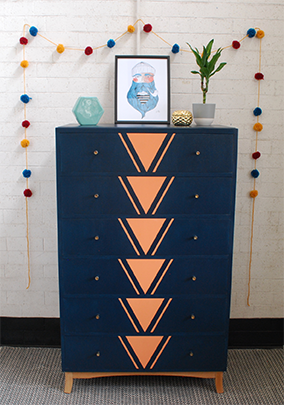
The best part of it, is that old furniture is often better made than the equivalent flat-packed furniture we get today and with a little bit of time, love and care, you can create a completely unique piece of furniture for your home that no one else will have. I also love that these pieces of furniture have a history of their own and through transforming and updating them we can breathe a new lease of life into them.
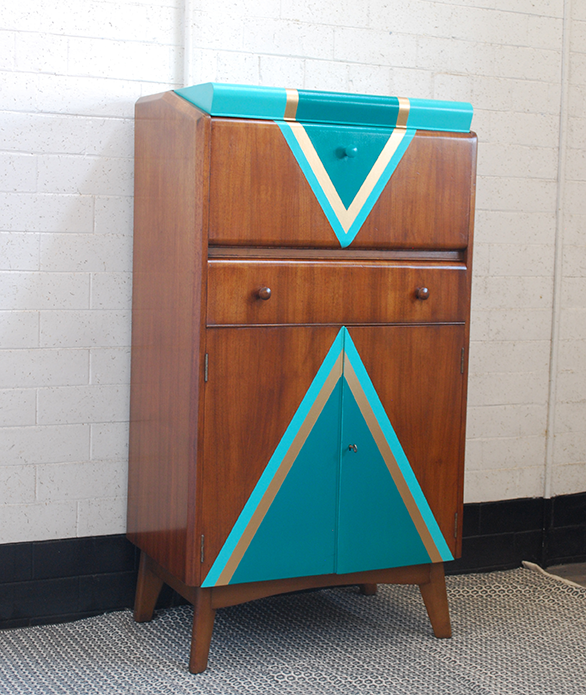
The idea of upcycling a piece of furniture can be a bit daunting at first but it’s not so difficult if you follow the steps. I taught myself how to do it and made many mistakes along the way, so hopefully I can save you a bit of time by taking you through the process.
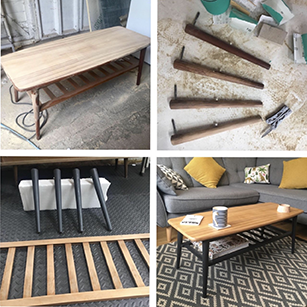
Here is a before and after photo of a coffee table that I upcycled for my lounge. I found it in a charity shop just around the corner from my home.
1. Clean item thoroughly with sugar soap or T.S.P and allow to dry
2. Check for any imperfections – fill any scratches or holes with wood filler and allow to dry
3. Sand item to take sheen off (‘key it’ to allow paint to stick)
Start with 80 grit and then move to a 120 grit.
– Can finish with a 180 grit to really smooth out any scratches from sanding.
(The higher the grit the less rough the sand paper)
– Always sand in the same direction as the grain of the wood
4. Use either a tack cloth or white spirit to remove all the dust created from sanding.
5. Now you are ready to paint!
Most of my furniture features at least some painted element and often I paint the entire piece. I love being able to experiment with colours and geometric shapes to give a dated piece of furniture a new lease of life. Paint is really good at hiding scratches and imperfections that it may have acquired in its previous life. I usually use a good wood paint (just make sure you paint with primer before applying) or Fusion Mineral paints (which do not require primer).

There are loads of gorgeous pieces of wooden furniture just waiting to be rescued from charity shops, so keep an eye out next time you are browsing. And if you feel a bit overwhelmed by taking on a big project then why not try doing some smaller items first such as wooden candle sticks, picture frames, trinket boxes or trays.
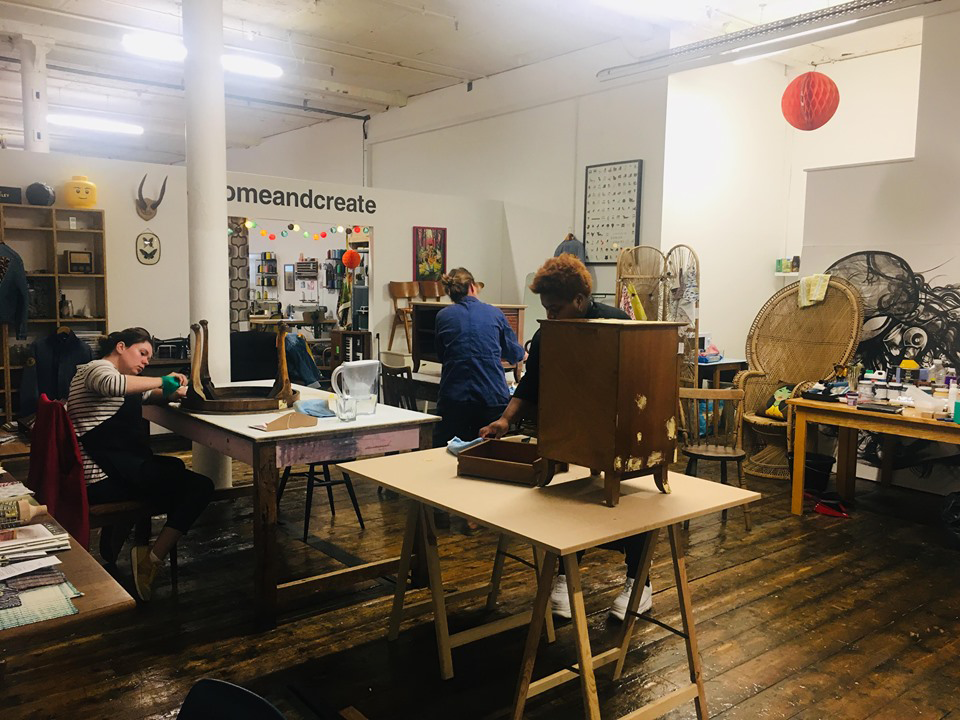
If you would love to have a go at upcycling and painting a piece of furniture but feel like you would benefit from some guidance then I run upcycling workshops from the gorgeous Pear Mill in Stockport. At the workshops, I talk you through how to prepare your furniture; from using wood filler to choosing the right sand paper as well as help with paint brush selection and advice on different top coats you can use. I will demonstrate how to use masking tape to create modern geometric designs so that you will leave feeling confident and full of ideas for future upcycling projects.
Hannah’s next workshop is on Friday 28th February and they take place once a month. To book a place and for more information visit www.treadsoftlydesigns.co.uk
Follow on Instagram @treadsoftlyuk
Life is getting more expensive by the minute and we’re all looking for ways to increase the cash in our pockets. There are huge savings to be made by investing in reusable and sustainable versions of things you use everyday. We’ve put together 6 switches you can make to start saving money. If your family of 4 did everything on this list you could save over £1670 a year!
Drying hands, sorting spills and general cleaning, towels are a necessity. Paper towels are made from trees which take decades to grow. Trees are brilliant at absorbing some of the excess CO2 we produce, cutting them down just so we can dry our hands is not very smart. What’s the sustainable option? Washable towels. We use fabric towels in the bathroom, so why not the whole house? By switching from paper to fabric towels for as little as £15 for a set, you could save hundreds a year. Granted, you need to wash them, but throw them in with your normal towels, pop a pile where the kitchen roll used to be and start saving money and trees.
Fancy £91 off your energy bill?
Swapping a traditional 100 watt bulb for a LED will save you £13 per bulb, per year. Older incandescent bulbs require up to 80% more energy as they produce a lot of heat. Using less energy benefits your pocket, but also means less fossil fuels are being burned. Arguably LED bulbs are pricier than incandescent bulbs, at about £5 each, so this swap might be best done when your old incandescent bulb comes to the end of it’s life.
Treat yourself and save £130 a year.
After the initial investment on your fabulous, personalised reusable cup, with a lid that actually stays in place (no more coffee dribbling on your t-shirt or sloshing about in the car) you can cash in on savings at coffee shops. Some high street chains like Pret a Manger will give you 50p off the price of your drink in a reusable cup. Costa will give you an extra stamp on your loyalty card, meaning you only buy 4 drinks instead of 8 to get a free one. If you’re a caffeine addict, this one is a no brainer.
Look good whilst saving £11
for the skincare lovers, and this swap doesn’t even require investment. To grow 1kg of cotton (the same size a t-shirt) it requires the same amount of drinking water as one person needs for 2.5 years! That and the nasty pesticides involved in growing cotton means a reusable option is much more sustainable than throwing away hundreds of pads each year. You can cut your own fabric pads from an old t-shirt or towel. It’s best to pop them into a little bag if washing in the machine so they don’t escape. If you want to buy a set of soft fabric wipes, that come with a handy little washing bag, it’ll set you back just £2 and you’ll get savings after less than 2 months.
£820 up in smoke.
Single use vapes contain precious elements like lithium, an important component in electric vehicle batteries. Vapes are also wrapped in plastic that can’t be recycled. Single use vape pens are not only terrible for the environment, they’re awful for your finances. If you vape everyday you could be burning through an extra £820 every year.
Even if you keep vaping to when you socialise at the weekend, single use vapes could be costing you 3 times as much as a reusable device.
Roll up for £250 worth of savings.
British people can feel a bit weird discussing what goes on in the loo, but bidets are the preferred way to clean up in many countries. A family of 4 flushes £250 worth of toilet roll down the drain every year.
Simple wall mounted hand-held bidets start from around £25 and you’d expect to use around £18 of additional water for 4 people.
These swaps won’t just save you money, they’ll help to conserve resources. The planets resources are running out quickly and we urgently need to change the way we consume to be able to continue to enjoy everyday things we take for granted. Reusing things to reduce the amount of stuff we throw away is a vital stage in the loop/Is vital to stay in the loop.
Learn more about being in the loop.
We’ve put together a list of local, sustainable businesses that are in the loop and contributing to a circular economy. We hope these examples will inspire you to be in the loop and access some of the brilliant schemes and businesses that are happening in Greater Manchester.
Open Kitchen create meals from food that would have been wasted, even though it’s perfectly edible. The social enterprise intercepts food that has been over produced or deemed too wonky for supermarket shelves and saves it from the bin. Their chefs create seasonal and fresh food at two cafes in Greater Manchester. Open Kitchen also offer catering so you can enjoy delicious and sustainable food at your next event.
The UK wastes 9.5 million tonnes of food every year, 70% of which could have been eaten. With so many people in the UK struggling with food scarcity, it’s more important than ever to Buy, Keep, Eat, Repeat (link to BKER page in text)
SUSTAINABLE SOURCING | Open Kitchen (openkitchenmcr.co.uk)
Founded in Stockpot in 2007, the brand has become a titan of second-hand tech. Music Magpie buy used phones from individuals, refurbish them, and put them up for sale and to rent. The company keeps tech in the loop as long as possible, a brilliant example of the circular economy benefiting customers and reducing electronic-waste (e-waste). It’s not just phones and laptops, you can even sell them CDs and books.
The UK is one of the highest produces of e-waste, with the average person wasting 23.9 kg every year. E-waste contains precious metals that are essential to make more electronics. Many of these metals are finite meaning they will run out if we don’t reuse them. You can recycle small electricals at the recycling centre, batteries at most supermarkets and you can return your appliance to the shop you bought it from for them to recycle.
Sustainability | musicMagpie (musicmagpieplc.com)
With 2 zero waste shops in Greater Manchester, Lentils and Lather are helping residents to reduce unnecessary packaging and go plastic free. Their shops stock everything from fresh produce, to cleaning products and spices. Zero waste shopping couldn’t be easier, you take your own pots, jars, and tubs along to the shop, weigh them, fill with goodies and pay for the weight.
We all know plastic is a huge problem, with the average family throwing away 66 pieces of plastic every week. Even if you can’t access a zero waste shop, small changes like choosing the glass jar instead of a squeezy bottle or buying loose fruit and veg instead of using the disposable bags (you’ll wash it anyway!) will add up and make a difference.
Lentils and Lather – sustainable shopping in South Manchester
Based in Stretford, Stitched Up are a not-for-profit that promotes sustainable fashion. They offer a range of courses for beginners interested in learning to sew, repair and make their own clothes. Their regular ‘clothes swap’ events promote keeping clothing in the loop for as long as possible.
With our UK wardrobes hiding £30 million worth of clothes that have never been worn, we’re clearly buying much more than we need. Fast fashion is hugely destructive, emissions from the fashion industry are higher than all international flights and shipping combined.
Giggacycle collect computers and laptops and recycle them safely. Working with businesses and individuals, they collect items for free and ensure all personal data is wiped. The equipment is then refurbished and sold. Whatever can’t be refurbished is recycled so the components can be used again. They even offer cashback so you get money for the recycled stuff.
The average Greater Manchester home hides nearly 20 unused electrical items. E-waste is the fastest growing waste stream in the UK, and £370 million per year is lost when the precious materials like gold and copper are not recycled.
IT Disposal | Computer Recycling | Data Destruction (gigacycle.co.uk)
We are supporting the Greater Manchester Ageing Hub’s celebrations for International Day for older persons. Sow the City, who we are working with on our composting projects, have written this blog about how composting can be done in small spaces, when you don’t have access to a large open space.
Get your discount on Bokashi & compost bins here.
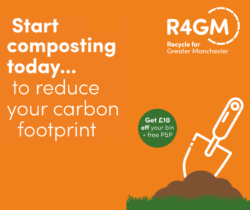
Composting doesn’t need lots of space, time, and energy. There are simple, cheap, and efficient ways that you can get composting right now, in small spaces, balconies, and even indoors.
Creating your own compost helps save money, helps you grow healthy indoor and outdoor plants, and minimises your impact on the environment. Below are some tips to composting when you have limited space to work with.
Looking to make use of a wide variety of kitchen scraps? Vermi-composting may be the answer! This method uses a bin full of worms to break down peelings and cardboard, to produce a harvest of wonderful worm-fuelled compost for your house and garden plants.
A worm bin will take up very little space and can even be placed in a cupboard or under the sink in your kitchen. You can buy a ready–made worm composting kit or make one quite easily yourself. And don’t worry – the process is fuss and odour free.
Composting with worms can take as little as three months, worms will eat a wide variety of food waste, like the items you’d stick in your food waste recycling bin – avoid citrus, onions, bread, meat, and dairy. Vermi-composting requires very little physical effort to maintain compared to a typical composting which works best with regular turning.
You can make your own wormery using materials found at home. Take a look at this video for a simple how to guide. The worms used for composting can all be bought online! Choose brandling, manure, red or tiger worms for the best results.
Another option is the exotic sounding bokashi! The word is Japanese and translates to “fermented organic matter”. This technique coverts your kitchen waste into a fermented soil supplement in as little as 10 days. You can compost an even wider variety of kitchen scraps in this way, including fruit, veg, meat and dairy. The special ingredient is a bokashi inoculant, this is usually made up of some kind of wheat germ or sawdust with molasses, which acts as food source for a micro-organism. This inoculant can be bought quite cheaply online, or you can even make your own.
The whole process happens in a bokashi bucket, which has an airtight lid and a tap at the bottom to drain off any liquid preventing the bucket from getting too smelly. What’s created after a couple of weeks is a fermented mixture which can be dug directly into the soil or added to a compost bin.
Recycle for Greater Manchester are working with Get Composting to provide residents in Bolton, Bury, Manchester, Oldham, Rochdale, Salford, Stockport, Tameside, and Trafford the opportunity to get a discounted price on bokashi bins!
If you love a brew, and you love your house and garden plants, it’s win-win with this simple technique! Coffee grounds act as a natural fertiliser, and can provide a healthy dose of nitrogen, an essential nutrient for plant growth and metabolism. Using coffee can deter pests, improve soil quality, and even keep cats away.
The best way to use coffee grounds on your plants is to apply as a mulch or top-dressing to the soil. Around a spoonful of coffee grounds can be added every 4 to 6 weeks. Some houseplants particularly enjoy coffee grounds including peace lilies, Christmas cactus, miniature roses and jade.
Coffee can also be added to an existing compost heap, or you can use leftover cold liquid coffee mixed with tap water to make a simple plant fertiliser.
Find out more about using coffee as a fertiliser in your home and garden here.
The Food Collective Salford were granted £10k from the Recycle for Greater Manchester Community Fund (2021 – 2022) to turn their community supermarket into a zero waste shop.
What have you achieved with the project so far?
For the initial set up we were able to buy zero waste dispensers, scales and liquid dispensers along with reusable containers such as kilner jars. This was the start of the project and we invested in display materials and online marketing to show what we were doing and to encourage our community to cut down on packaging waste.
This encouraged us to expand our range to more zero waste products including low waste beauty products, bamboo toothbrushes and more.
We launched a jar exchange programme and it has encouraged us as an organisation to look more closely at how we reduce waste.
These changes have brought in a new demographic of customers to the shop and have gained us a new following in the 25 – 34 years age range.
How has it benefited your community?
The fact that we have been providing free starter jars and containers has been an incentive to people to come and give it a try. Our following has grown from there.
We have also been able to use this as an education tool to local nursery and primary children.
As we have been able (following the pandemic)to add a few tables to the store so that there is a community hub around the project.
What has been your biggest success so far?
Getting the dispensers in place, branded up and with instructions alongside the free jar scheme has been fab. Its given people who may not have considered zero waste buying before a reason to get involved.
What has been your biggest challenge so far?
We are still a relatively small community supermarket so it has took us some time to find suppliers to supply to us in the bulk we need.
There’s been some issues with the events we have wanted to do with Covid restrictions but we have managed to use streaming etc to get out to a bigger audience.
What advice would you offer to anybody looking to apply next year?
Be prepared to make small changes and adapt as you go!
Follow the Food Collective Salford on Facebook for the latest on their project!
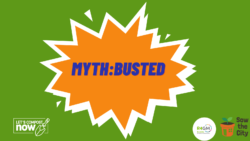
Don’t believe everything you hear when it comes to composting. Here’s 5 common composting myths with some surprising truths!
Myth #1: Composting smells
People think that a composter is guaranteed to cause a bad odour. The truth is that compost doesn’t always smell – and if bad smells do arise can be quickly banished. For example, if your compost smells of rotting vegetables or rotting eggs, then is probably due to too little oxygen in the mix. Simply turn your compost pile to get more air get into it and the problem should go away.
Another common complaint is your compost smells of ammonia. In this case you probably have too much green material in the mix (e.g. grass clippings, veg peelings). If you add more brown material to the mix to (e.g. cardboard, dried leaves) before long it will be smelling sweet again.
Myth #2: Compost bins attract rats
Often people will avoid composting because they think that it will attract rats – but that’s far from certain. Just like some people rats and mice are on the lookout for a nice meal and some peace and quiet. To keep these unwanted furry visitors away reduce the amount of rat friendly food in your heap and keep the heap well used and busy. Avoid adding cooked food and items like bread, meat and dairy to your compost too, and keep it nice and damp. With these simple steps they’ll probably go elsewhere.
Myth #3: A compost heap takes up lots of space
People are often put off composting because they don’t think they have the space. But composting can take up really as much or as little space as you’d like it to. It’s true that bigger sites can take up large areas of space and create high volumes of the lovely black stuff. However, there are lots of other non-traditional ways to compost in small spaces too (e.g. wormeries, bokashi) – take a look at our previous blog post here: https://recycleforgreatermanchester.com/composting-in-small-spaces/
Myth #4: I use fertiliser on my garden, so I don’t need compost
You may be using fertiliser to feed your plants but adding compost too has so many extra benefits. Compost adds organic material to your soil, improving soil structure, increasing water retention and reducing erosion by surface water runoff. Compost also acts as a slow-release fertiliser, as it continues to break down when added to your soil, providing the nitrogen, phosphorous and potassium that your plants thrive on. Compost-fed gardens tend to have fewer problems with disease and pests and much better yields.
Myth #5: Creating compost is too complicated, and too much like hard work!
Making compost is a natural process that is easy to reproduce at home. Everything composts down eventually – think leaves on a forest floor. Your job is to speed along the process and make sure it happens as effectively as possible. You’ll just need to make sure you follow 3 simple rules: have a good balance of green and brown materials (2-3 parts brown or dry material (cardboard, dried leaves) to 1 part green or wet material (kitchen scraps, grass clippings, weeds); keep it damp but not soggy and keep it aerated (either by turning with a fork or use a compost tumbler).
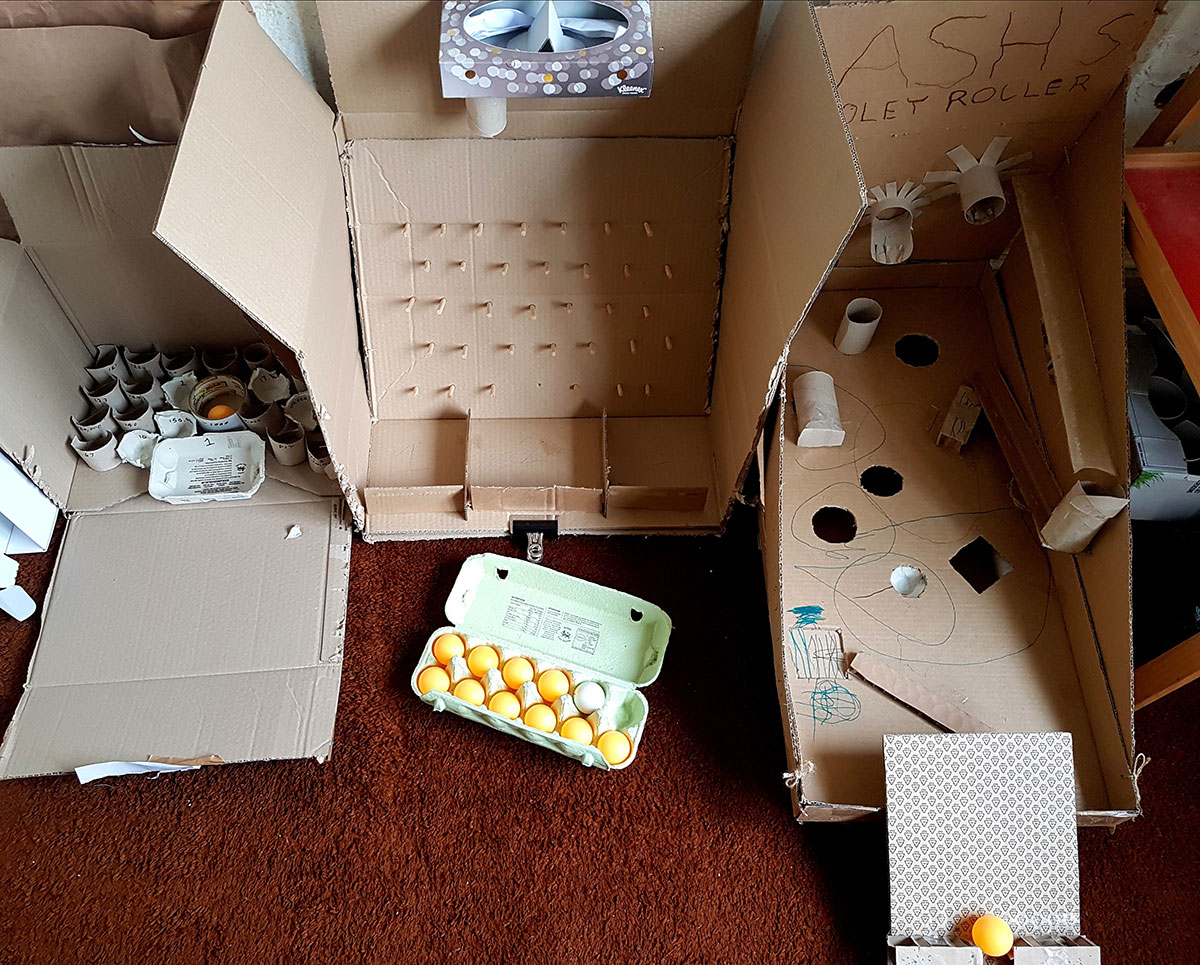
The group were also proud to share how they we’re being more eco-friendly including setting up crisp packet recycling through a TerraCycle UK scheme!
Find out more about booking a session here.
The group enjoyed a virtual recycling session with our Education team enabling them to be eligible to enter the quiz and with the highest number of students going online and taking part they were announced as our March winners.
Each student who took part has received prizes which includes a reusable bag, reusable water bottle and recycled pencil.
Congratulations to Rochdale Rangers!
Are you looking to book a virtual session? You can do so by visiting this page on our website.
If you haven’t already why not test yourself by taking part in the quiz today.